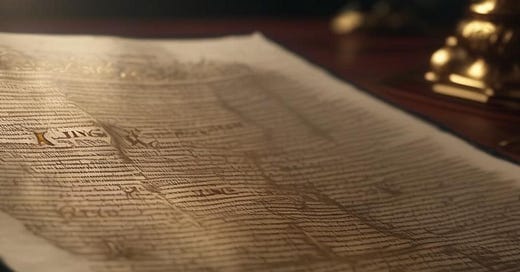From the Magna Carta to the Australian Constitution:
A Legacy of Freedom, Rights, and Accountability
Introduction
The principles of freedom, individual autonomy, and accountability have been the cornerstones of governance since the Magna Carta in 1215. As modern societies grapple with the complexities of misinformation, social media regulation, and whistle-blower protections, it is vital to remember the foundational values upon which governments were established:
to serve the people and ensure liberty, justice, and fairness.
This article traces these values from the Magna Carta to the Australian Constitution, highlighting the imperative to uphold free speech and whistle-blowers' rights in a democratic society.
1. Magna Carta: The Genesis of Freedom
The Magna Carta is often heralded as the first document to limit the power of rulers and assert the rights of individuals. Although its immediate impact was limited to England’s feudal system, it established enduring principles:
"To no one will we sell, to no one deny or delay right or justice." – Magna Carta, 1215
Rule of Law: No one, not even the king, is above the law.
Protection from Arbitrary Action: Clause 39 declared that no free man shall be punished except through lawful judgment or the law of the land.
Accountability to the People: It laid the groundwork for governments being accountable to their citizens rather than operating as tyrannical entities.
Edit 8 May 2025 5pm (addition—Gresham College Lecture)
Magna Carta: The Medieval Context and the Part Played by William Marshal... A modern understanding of the Magna Carta by Lord Igor Judge, Former Lord Chief Justice of England and Wales
2. British Constitutional Influences on Australian Governance
Australia inherited its legal and constitutional foundations from Britain, drawing on key documents and principles:
The Bill of Rights (1689): Protected parliamentary freedoms and established the precedence of representative governance.
Common Law Rights: Embedded freedoms such as speech, the presumption of innocence, and fair trials.
These traditions were carried into the Australian Constitution, creating a framework for protecting individual rights and freedoms.
"The liberties of a people are a barrier against the tyranny of rulers." – Adapted from 18th-century British legal commentary.
3. The American Influence on the Australian Constitution: Rights Should Be Implied
While the Australian Constitution draws heavily from British legal traditions, the American influence—particularly in terms of individual rights—cannot be ignored. The United States Constitution, grounded in principles of liberty and democracy, explicitly enshrines fundamental freedoms through its Bill of Rights. In contrast, Australia's Constitution omits such direct protections, relying instead on implied rights and legislative measures.
However, when the Australian Constitution is correctly read in the context of its framers and the era's prevailing influences, one could argue that certain rights should be implied.
The framers of the Constitution were undoubtedly aware of the American model, including its commitment to freedoms such as speech and religion. While they chose not to replicate a Bill of Rights explicitly, the underlying principles of individual liberty and democratic governance remain foundational to Australia’s legal system.
The implied freedom of political communication, as recognized by the High Court, is a reflection of this. Yet, it is limited in scope and does not encompass broader rights, such as freedom of speech, in the manner that the American framework provides. This limited interpretation risks undermining the Constitution's intent to foster a free and democratic society.
A deeper understanding of the framers' influences—both British and American—supports the view that rights like freedom of speech and expression should have been implied within the Constitution’s text and spirit. Such a reading would align with the principles of natural justice and the global democratic movement of the time, which heavily influenced the drafting of governance structures worldwide.
The absence of explicit rights has caused unintended consequences, leaving Australia in a position where fundamental freedoms, when challenged by governance, depend on judicial interpretation or legislative goodwill.
Interpreting the Constitution to imply these rights, consistent with British common law principles and American constitutional ideals, would strengthen Australia’s democratic foundations and better reflect the framers' intent.
By embracing this broader contextual understanding, Australia has the opportunity to honour its constitutional heritage while addressing gaps in protecting individual freedoms. This approach would ensure that governance remains both legitimate and just in an evolving democratic society.
4. The Australian Constitution: Democracy in Action
The Australian Constitution, effective since 1901, enshrined the principles of representative democracy and limited government.
Implied Freedom of Political Communication: The High Court recognized this principle in Lange v Australian Broadcasting Corporation (1997), ensuring Australians’ right to discuss political matters freely.
Accountability in Governance: Sections like Section 51 (xxxi), which protects property rights, reflect broader protections for justice and individual autonomy.
Comparison of Implied Rights in Australia and Explicit Rights in the U.S. Bill of Rights
For a side-by-side comparison of the implied rights in the Australian Constitution and the explicit rights in the U.S. Bill of Rights, visit my X link for a Grok summary (may not be accurate). Always undertake your own research.
5. Protecting Whistle-blowers: Accountability in Practice
In a democracy, whistle-blowers play a crucial role in exposing corruption and abuse of power.
The Public Interest Disclosure Act 2013 provides protections for Australian whistle-blowers, rooted in the principles established by the Magna Carta: holding power accountable and preventing tyranny.
Suppressing whistle-blowers undermines democracy by allowing unchecked authority, a direct contradiction of the rule of law.

The plight of whistle-blowers in Australia, such as the former military lawyer David McBride who exposed alleged war crimes in Afghanistan and faced legal repercussions (presently sitting in jail), and journalist Julian Assange, whose detainment drew international attention, highlights the severe consequences of exposing corruption and seeking accountability. This reality extends beyond government and military spheres to the financial services industry, where individuals like Jeff Morris from CBA have also faced retaliation for revealing misconduct. The destruction of personal lives and careers serves as a stark reminder of the urgent need for strong whistle-blower protections (and remedies) for all citizens, safeguarding their right to speak out without fear of retribution.
These cases underscore the necessity for reforming corporate laws to include stronger deterrents for fraud and comprehensive protections for whistle-blowers. Without such measures, individuals are left to endure significant personal and financial hardship as they confront litigation and threats from powerful corporations. This critical issue and its implications for both justice and democracy will be explored more deeply in a chapter of my upcoming book.
6. The Role of Religion and Moral Governance
The Australian Constitution acknowledges God in its preamble, reflecting the ethical and moral framework underpinning governance. Freedom of religion and expression are deeply intertwined, ensuring individuals can act according to their conscience. Suppressing this right undermines both the moral legitimacy of governance and the protection of religious freedoms.
"Humbly relying on the blessing of Almighty God." – Australian Constitution, Preamble
6. Modern Challenges: Social Media and Misinformation Bills
Social media has become a vital platform for free expression, akin to the printing press in the 17th century. Proposals to ban or over-regulate these platforms under the guise of combating misinformation threaten the foundations of free speech.
Governments must balance concerns about misinformation with the necessity of open dialogue. Overreach in this area risks silencing whistle-blowers, stifling dissent, and creating the tyranny the Magna Carta sought to prevent.
7. A Global Context for Freedom
Australia is also bound by international human rights instruments:
Universal Declaration of Human Rights (1948), Article 19: "Everyone has the right to freedom of opinion and expression."
International Covenant on Civil and Political Rights (1966), Article 19: Guarantees the right to share and receive information freely.
These commitments reinforce Australia’s obligations to uphold freedom of speech and protect whistle-blowers.
Conclusion
From the Magna Carta to the Australian Constitution, the principles of freedom, accountability, and individual rights remain central to just governance. In today’s digital age, where the right to share information and expose wrongdoing is under threat, it is crucial to defend these principles vigorously.
Suppressing free speech, whistle-blowers, or social media platforms risks reverting to the tyranny that foundational documents were designed to combat. To ensure a fair and just society, we must uphold the legacy of freedom, protect whistle-blowers, and champion the right to expression in all its forms.
Download a copy of ‘Legacy of the Magna Carta’ Poster, or visit the website of Rule of Law to read more. Click for direct access to the PDF.
Call to Action
Let us honour the principles of the Magna Carta and the Australian Constitution by standing against overreach and protecting the rights of individuals to speak out, share information, and hold power accountable.
Subscribe to this platform for regular updates on advocacy, democracy, and justice.
Share this article to raise awareness of these critical issues.
To better appreciate the historical significance of the Magna Carta and its relevance today, watch this engaging depiction in the movie Ironclad:
Edited 7 May 2025
two new links provided for the movie version relevant to the author’s article
the previous link appears to be unavailable
The Magna Carta’s emphasis on limiting authority and upholding rights is a timeless principle. As we consider policies impacting families and individual freedoms today, its lessons remain remarkably relevant.
To Standing Against Overreach, Protecting the Right to Share, Upholding Autonomy & Freedom, Engaging The Rule of Law and Enforcing Accountability,
-Dianne

If you enjoy my content and would like to support my work, please consider making a donation.
Your support helps me continue to create valuable content and advocate for important causes. Every little bit helps!
Additional resources:
Amelia Devlyn, The Magna in Contemporary Australia, The Western Australian Jurist, (PDF 2016) Vol 7, [389]-[397]<https://classic.austlii.edu.au/au/journals/WAJurist/2016/11.pdf>
Commonwealth of Australia Constitution Act - Section 51
https://classic.austlii.edu.au/au/legis/cth/consol_act/coaca430/s51.html
Commentaries on the Law of England Volume 4
https://lonang.com/wp-content/download/Blackstone-CommentariesBk4.pdf
Liberty Fund Inc, Blackstone on the Absolute Rights of Individuals (1753)
https://oll.libertyfund.org/pages/blackstone-on-the-absolute-rights-of-individuals-1753
National Museum of Australia, Defining Moments in Australian History
https://www.nma.gov.au/defining-moments/defining-moments-timeline
Association of Certified Fraud Examiners, How white-collar Criminals Differ from other Criminals
#MagnaCarta #AustralianConstitution #Ironclad #UDHR #ICCPR #ICESCR






